Intel Xeon E Six-Core Review: E-2186G, E-2176G, E-2146G, and E-2136 Tested
by Ian Cutress on November 5, 2018 12:00 PM EST- Posted in
- CPUs
- Intel
- Xeon
- Enterprise CPUs
- Xeon E
CPU Performance: Office Tests
The Office test suite is designed to focus around more industry standard tests that focus on office workflows, system meetings, some synthetics, but we also bundle compiler performance in with this section. For users that have to evaluate hardware in general, these are usually the benchmarks that most consider.
All of our benchmark results can also be found in our benchmark engine, Bench.
PCMark 10: Industry Standard System Profiler
Futuremark, now known as UL, has developed benchmarks that have become industry standards for around two decades. The latest complete system test suite is PCMark 10, upgrading over PCMark 8 with updated tests and more OpenCL invested into use cases such as video streaming.
PCMark splits its scores into about 14 different areas, including application startup, web, spreadsheets, photo editing, rendering, video conferencing, and physics. We post all of these numbers in our benchmark database, Bench, however the key metric for the review is the overall score.
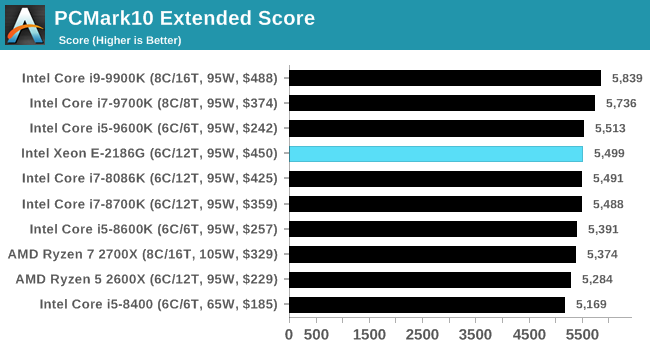
There's a slight issue using PCMark with having IGP drivers installed then restarting the system using a discrete GPU installed. We'll come back and rerun when the time permits.
Chromium Compile: Windows VC++ Compile of Chrome 56
A large number of AnandTech readers are software engineers, looking at how the hardware they use performs. While compiling a Linux kernel is ‘standard’ for the reviewers who often compile, our test is a little more varied – we are using the windows instructions to compile Chrome, specifically a Chrome 56 build from March 2017, as that was when we built the test. Google quite handily gives instructions on how to compile with Windows, along with a 400k file download for the repo.
In our test, using Google’s instructions, we use the MSVC compiler and ninja developer tools to manage the compile. As you may expect, the benchmark is variably threaded, with a mix of DRAM requirements that benefit from faster caches. Data procured in our test is the time taken for the compile, which we convert into compiles per day.
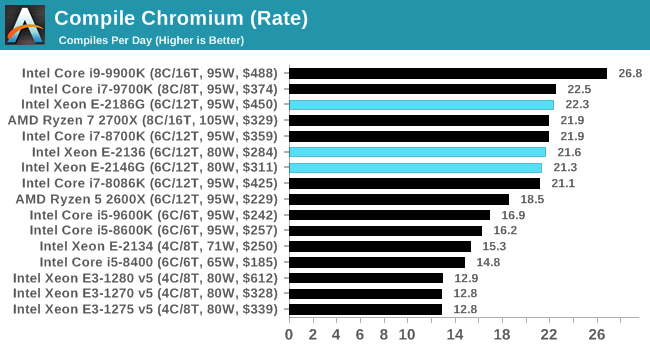
3DMark Physics: In-Game Physics Compute
Alongside PCMark is 3DMark, Futuremark’s (UL’s) gaming test suite. Each gaming tests consists of one or two GPU heavy scenes, along with a physics test that is indicative of when the test was written and the platform it is aimed at. The main overriding tests, in order of complexity, are Ice Storm, Cloud Gate, Sky Diver, Fire Strike, and Time Spy.
Some of the subtests offer variants, such as Ice Storm Unlimited, which is aimed at mobile platforms with an off-screen rendering, or Fire Strike Ultra which is aimed at high-end 4K systems with lots of the added features turned on. Time Spy also currently has an AVX-512 mode (which we may be using in the future).
For our tests, we report in Bench the results from every physics test, but for the sake of the review we keep it to the most demanding of each scene: Ice Storm Unlimited, Cloud Gate, Sky Diver, Fire Strike Ultra, and Time Spy.
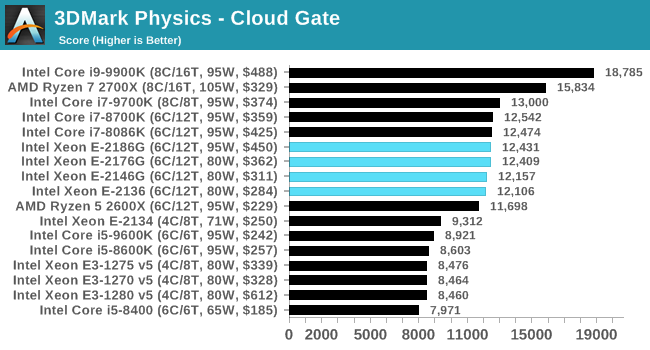
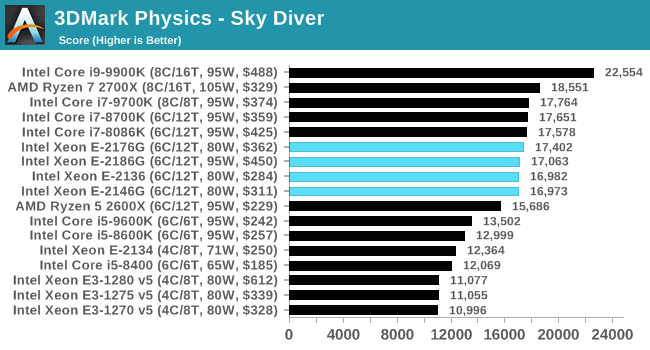
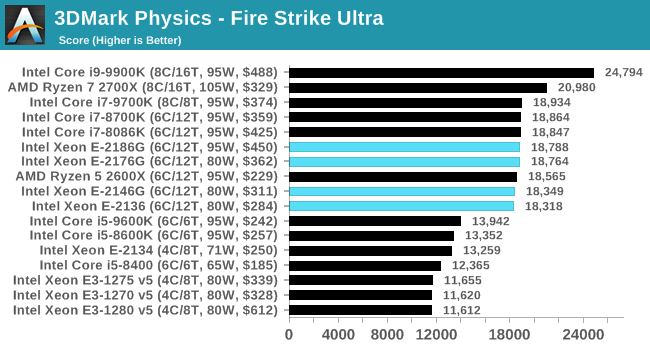
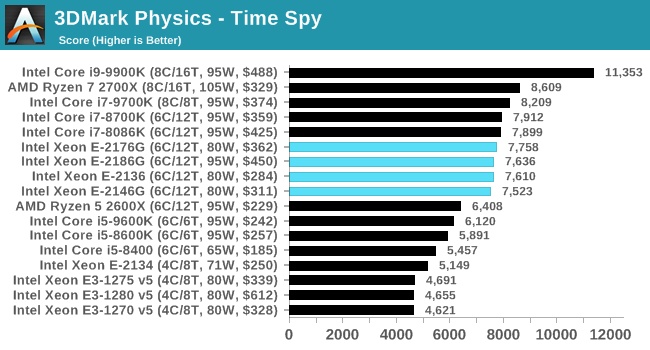
GeekBench4: Synthetics
A common tool for cross-platform testing between mobile, PC, and Mac, GeekBench 4 is an ultimate exercise in synthetic testing across a range of algorithms looking for peak throughput. Tests include encryption, compression, fast Fourier transform, memory operations, n-body physics, matrix operations, histogram manipulation, and HTML parsing.
I’m including this test due to popular demand, although the results do come across as overly synthetic, and a lot of users often put a lot of weight behind the test due to the fact that it is compiled across different platforms (although with different compilers).
We record the main subtest scores (Crypto, Integer, Floating Point, Memory) in our benchmark database, but for the review we post the overall single and multi-threaded results.
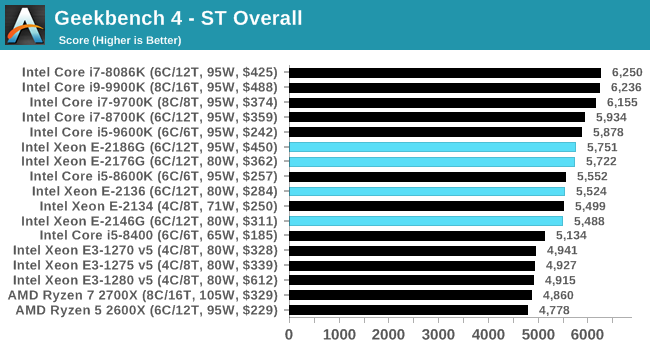
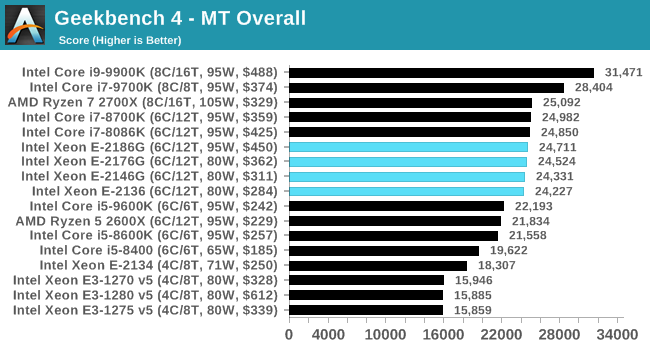










48 Comments
View All Comments
bolkhov - Friday, November 9, 2018 - link
Yes it does.72 for ECC vs. 64 for non-ECC.
notb - Wednesday, November 7, 2018 - link
Go ask your IT department if Ryzen's ECC "support" passes their security policy. :-)twtech - Sunday, November 18, 2018 - link
Most IT departments don't build their own systems. They'll standardize with something like Dell or HP, and maybe do things like RAM/HDD upgrades, etc.The cost of the CPU in a system is usually a relatively small cost compared to the overall total. Support costs can dwarf initial purchase costs. The more that a company can standardize their hardware, the easier it is to maintain it.
For example, IT may want to test patches before letting them be applied across the organization. If, in an ideal scenario, every system was exactly the same, then potentially only one test would be needed to make sure it works properly.
Of course that often won't be possible, but the closer they can remain to that ideal, the better.
HStewart - Monday, November 5, 2018 - link
To me it looks like AVX 512 gets a whopping 44% ( ~ 5200 / 3600 ) increase on similar equip similar CPU. It would be nice to see same cpu with and without AVX 512 enabled test.osrk - Monday, November 5, 2018 - link
FYI provantage told me they were getting in their shipment Nov 12. I have one on pre order.Dr_b_ - Monday, November 5, 2018 - link
Have my 2186G on pre-order with them as well, for over a month now. Already have the 64GB ECC UDIMMs and Asus C-246 Pro board just waiting. IMHO, the biggest let down with the Asus board is that it doesn't have USB 3.1 2.0 header on the motherboard. Have inquiry with Asus about support for 9900K CFL-R CPU's haven't heard back yet.mooninite - Tuesday, November 13, 2018 - link
Did you get yours shipped out yet? Websites are still showing either "out of stock" or "special order" for these Xeons.osrk - Friday, November 16, 2018 - link
No. They've had them in and out of stock. If you pre-ordered and the item comes in stock for even a penny more your item will not be shipped. They will only fulfill your order when the item comes into stock for the amount you paid. This has left a very bad taste in my mouth when ordering with Provantage and I'm likely not going to order from them again.For example the E-2176G was in stock with them for $1 more than I paid. Did they ship it or notify me that I could pay the extra $1 and have it ship? Nope. I'm writing up my experiences with them on the ratings site.
Dragonstongue - Monday, November 5, 2018 - link
wonder how much of these things tested are "biased" towards making Intel look as "rosy" as possible to steer away any shortcomings.. I would imagine they have very specific test methodology to ensure "weakness" are not shown.. Probably will never happen, but it would be real nice if "everyone" raced on the same track sort of speak so the best "car" wins, not because other "cars" are hobbled by illegitimate tactics.AnnoyedGrunt - Tuesday, November 6, 2018 - link
Yes, I suspect that Anandtech opened the "hood" on the AMD "cars" and drained their "blinker fluid" and damaged their "muffler bearings" so they couldn't "race" as well.I'd go on, but I ran out of quotation marks.
-AG